Soprano Anna Netrebko steals hearts, show with luminous ‘Bohème’ debut at Lyric Opera
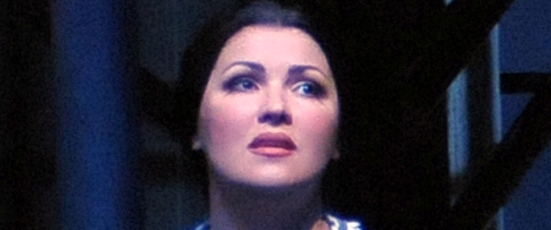 Review: Anna Netrebko and Joseph Calleja in Puccini’s “La bohème,” now headlining at the Lyric Opera of Chicago, through March 28. ★★★★
Review: Anna Netrebko and Joseph Calleja in Puccini’s “La bohème,” now headlining at the Lyric Opera of Chicago, through March 28. ★★★★
By Nancy Malitz
Russian soprano Anna Netrebko, mesmerizing in her Lyric Opera debut as the sweet-hearted heroine of Puccini’s opera “La bohème,” opened her mouth to sing Mimi’s signature aria, “Mi chiamano Mimi,” and tuned the Civic Opera House as if it were a fiddle, teasing out an extraordinary resonance as she opened up, degree by degree, until her lingering high A’s had the whole audience aquiver.
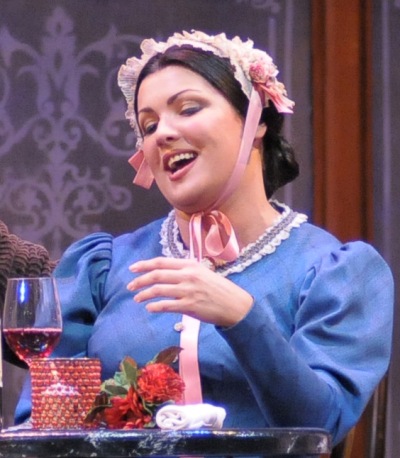 Irresistibly charming in the first blush of love, as Mimi is with Rodolfo — ably sung by Netrebko’s Lyric partner Joseph Calleja — Netrebko became even more luminous as death closed in on the consumptive heroine. Even when you closed your eyes, you had the feeling you could not take your eyes off this remarkable singer.
Irresistibly charming in the first blush of love, as Mimi is with Rodolfo — ably sung by Netrebko’s Lyric partner Joseph Calleja — Netrebko became even more luminous as death closed in on the consumptive heroine. Even when you closed your eyes, you had the feeling you could not take your eyes off this remarkable singer.
The Lyric’s record is admirable as an opera company that functions on a high level, yet it’s important to be reminded what is possible when the stars align precisely to present an artist in her prime, singing a role she still loves, that is right for her at this very moment.
And although this production fell short overall in matching the level Netrebko attained, her debut was a night not soon to forget at the Lyric. Remaining tickets, mostly around the house’s fringes, are likely soon to be gone.
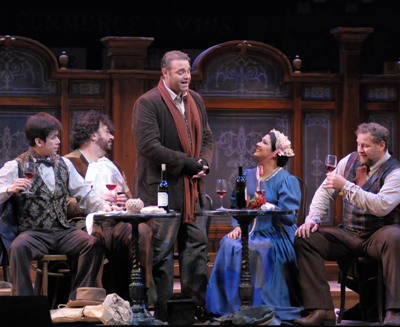 The story opens in Rodolfo’s crowded garret atop Paris chimneys, where Mimi arrives, asking for assistance.
The story opens in Rodolfo’s crowded garret atop Paris chimneys, where Mimi arrives, asking for assistance.
Their affair moves forward at an operatic pace, which supposes love at first sight and accelerates through bristling musical modulations. Rodolfo’s impassioned romantic pass, “Che gelida manina,” to which she responds, “Mi chiamano Mimi,” telling him she’s a simple seamstress who lives alone, and their ensuing duet, “O suave fanciulla,” constitute some of the most familiar and beloved music in Puccini’s repertoire. Soon Rodolfo’s showing her off to his friends.
Calleja, a Maltese tenor, and Netrebko are old familiars together in these roles. Their mutual support and comfort was obvious as the story moved from the thrill of seduction in the first and second acts to the exhausting turmoil, jealousy and mutual obligation of love at its most demanding in the third and fourth.
Calleja’s rapid vibrato took some getting used to, especially in contrast to Netrebko’s oceanic waves, but his high C’s are glorious and his tenderness in Mimi’s death scene is a dagger to the heart.
 Puccini’s masterstroke of liveliness in this story is to present an additional set of lovers, the tempestuous Musetta and her sometime soulmate Marcello, who tend to quarrel when Mimi and Rodolfo spoon, and vice versa. The singing ideal is to present four stars of equal magnitude in these lovers’ roles, but the vocal fire-power of Netrebko and Calleja was unusually robust.
Puccini’s masterstroke of liveliness in this story is to present an additional set of lovers, the tempestuous Musetta and her sometime soulmate Marcello, who tend to quarrel when Mimi and Rodolfo spoon, and vice versa. The singing ideal is to present four stars of equal magnitude in these lovers’ roles, but the vocal fire-power of Netrebko and Calleja was unusually robust.
Thus soprano Elizabeth Futral, whose somewhat light voice sparkles at the top, came off more charming than naughty in Musetta’s showpiece “Quando m’en vo,” the braggadocio number intended to taunt Marcello to a jealous froth. She did have good chemistry with baritone Lucas Meachem, who played an impulsive Marcello, rambunctious and highly physical. Andrea Silvestrelli, as Colline, and Joseph Lim, as Schaunard, round out the sextet of bohemians; they were touchingly supportive to each other in the tragic final scene.
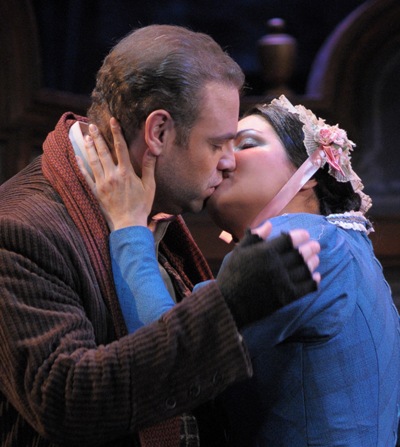 Netrebko and Calleja played out their story on the 1996 sets of Michael Yeargan, created originally for the San Francisco Opera, which worked best in the third act where, at the outskirts of Paris in light snowfall, Mimi and Rodolfo unite after a bitter quarrel and decide to tough it out together until spring. Netrebko and Calleja were rivetting in this duet, where the raw certainty of Mimi’s decline dictates new vows of tenderness.
Netrebko and Calleja played out their story on the 1996 sets of Michael Yeargan, created originally for the San Francisco Opera, which worked best in the third act where, at the outskirts of Paris in light snowfall, Mimi and Rodolfo unite after a bitter quarrel and decide to tough it out together until spring. Netrebko and Calleja were rivetting in this duet, where the raw certainty of Mimi’s decline dictates new vows of tenderness.
Other key dramatic challenges were not entirely solved by Yeargan (or by director Louisa Muller in this adaptation). The Christmas Eve scene in the Latin Quarter of Paris becomes divided left and right, squeezing the bustling full stage street scene down to half a stage to give space to the Momus Café, choking them both. The music flows from scene the scene; the stage needs to allow for that flow as well.
And we know Paris garrets are tiny, but this is theater, and really big things go on in Rodolfo’s flat, where four buddies pour out their hearts, outwit a landlord, dance with a fish and convene for Mimi’s final desperate moments and death. Yeargan’s garret is a claustrophobic space that recedes from large flat panels painted with a Parisian scape. It’s a setup for the initial encounter between the lovers; there’s a high-impact moment when the panels fly open and the moonlight flows in for their impassioned duet. But that master stroke comes at the expense of some crowding and confusion otherwise.
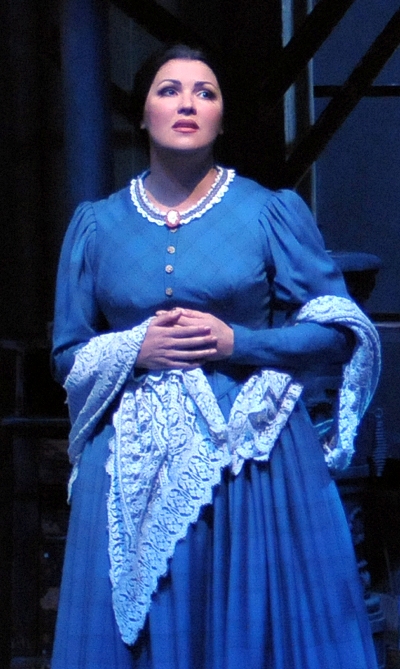 It’s of little matter. This was Netrebko’s night. The voice is without question extraordinary, the impact profound, the impression sincere. She has a way of stretching melodic lines into lingering threads of delicacy, beyond what would seem probable or even technically possible, which is the diva’s art, yet the Lyric Opera Orchestra under Emmanuel Villaume stayed with her all the way.
It’s of little matter. This was Netrebko’s night. The voice is without question extraordinary, the impact profound, the impression sincere. She has a way of stretching melodic lines into lingering threads of delicacy, beyond what would seem probable or even technically possible, which is the diva’s art, yet the Lyric Opera Orchestra under Emmanuel Villaume stayed with her all the way.
Netrebko is now 41, and her voice has never been better, melting, voluptuous and certainly ready for repertoire that’s heavier than the original coloratura roles that made her famous. It means fewer Adinas and more Tatianas in her future, which is a great thing for the opera world, because of the emotional complexity that she is able to layer into a role. The Lyric had to wait a long time to book Netrebko’s debut, nearly two decades longer than some regional American opera companies.
But perhaps the timing isn’t so bad after all. You tell me which aspect of Netrebko is the most immediately striking — that voluptuous voice, the expressive singularity, the musical instinct, the acting clout, the stunning physical beauty and grace. One could go on, but really, the only possible answer is yes.
Related Links:
- Performance location, dates and times: Go to lyricopera.org
- More about Anna Netrebko: Go to annanetrebko.com
- More about Joseph Calleja: Go to josephcalleja.com
- Joseph Calleja sings “Che gelida manina”: Check out his Metropolitan Opera 125th Anniversary gala performance
- Anna Netrebko sings “Quando m’en vo”: The other female lead’s signature aria, on Youtube
Captions and credits: Home page and top: Russian soprano Anna Netrebko is Mimi in “La bohème.” Descending: Mimi (Anna Netrebko) wears the new bonnet Roldolfo has purchased for her. Rodolfo (standing, Joseph Calleja) sings Mimi’s praises to his friends (left to right) Schaunard (Joseph Lim), Colline (Andrea Silvestrelli) and Marcello (Lucas Meachem.) Musetta (Elizabeth Futral) and Marcello (Lucas Meachem) have a tempestuous affair. Below: Anna Netrebko sings “Mi chiamano Mimi” in a contemporary production at the Salzburg Festival. Mimi Michael Yeargan’s set for Act 2, the Latin Quarter on Christmas Eve.
Tags: Andrea Silvestrelli, Anna Netrebko, Elizabeth Futral, Emmanuel Villaume, Joseph Calleja, Joseph Lim, La boheme, Louisa Muller, Lucas Meachem, Lyric Opera of Chicago, Michael Yeargan, Puccini

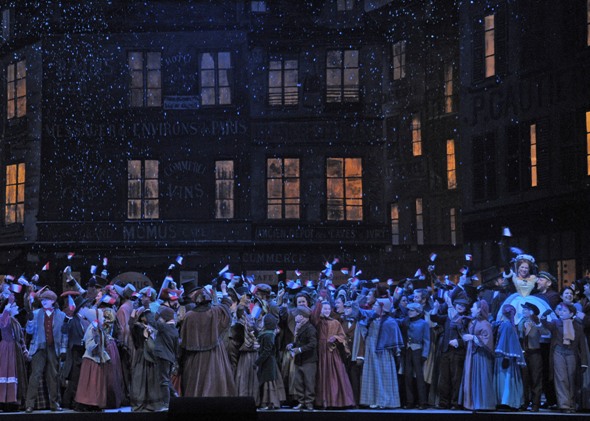

Yes the “second cast” production was an unforgettable experience. It will be a reference standard for me for many years.
You said “Calleja’s rapid vibrato took some getting used to, especially in contrast to Netrebko’s oceanic waves”. Well I just couldn’t get used to it – it was just too overwhelming. Especially next to Netrebko’s almost deliberately contrasting smoothness. Can you imagine how fabulous his voice would be if he toned it down?
Yes the “second cast” production was an unforgettable experience. It will be a reference standard for me for many years.
You said “Calleja’s rapid vibrato took some getting used to, especially in contrast to Netrebko’s oceanic waves”. Well I just couldn’t get used to it – it was just too overwhelming. Especially next to Netrebko’s almost deliberately contrasting smoothness. Can you imagine how fabulous his voice would be if he toned it down?